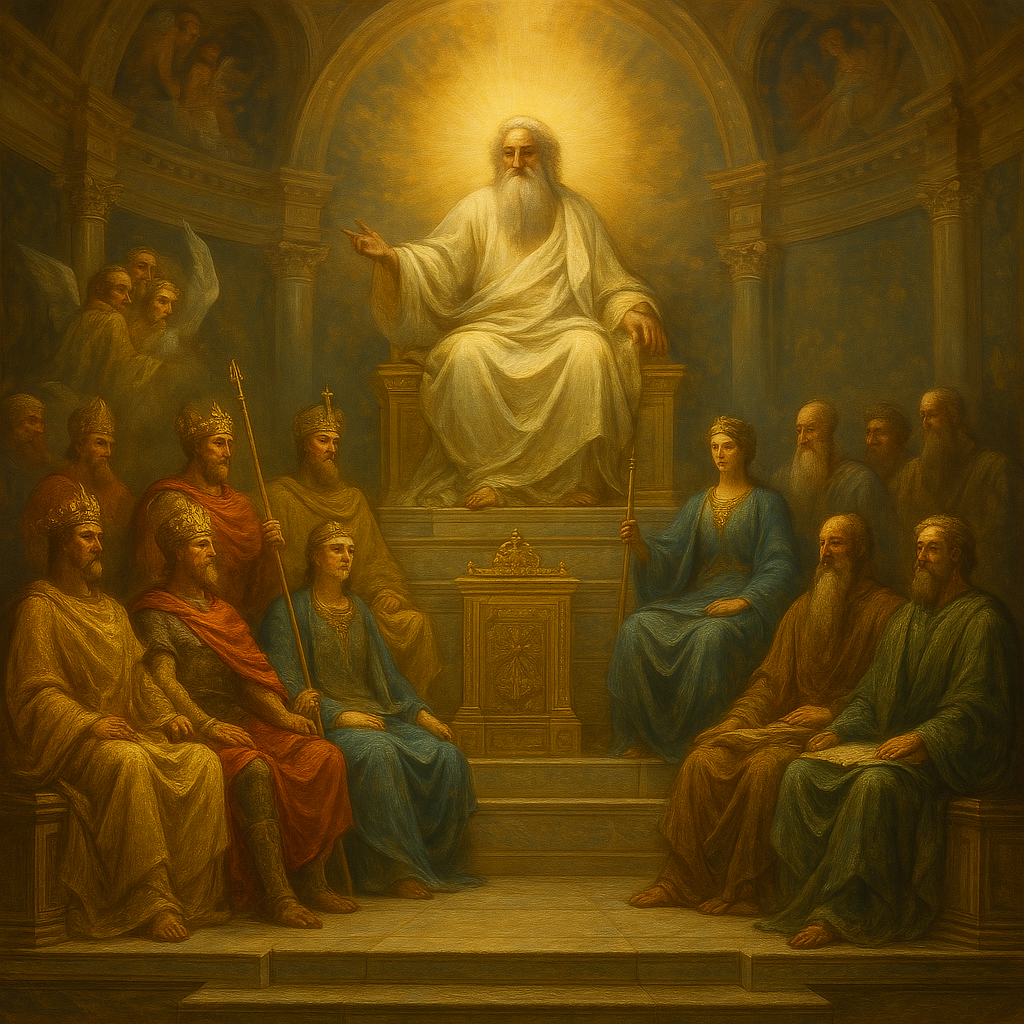Overview
Divine Councils and Hierarchies refer to structured groups of spiritual beings or deities that govern various aspects of the cosmos and human affairs within many religious and spiritual traditions. These councils typically consist of a supreme deity or high council that oversees a hierarchy of lesser deities or angels, each assigned specific roles and responsibilities. These structures help maintain order in the universe and mediate the relationship between the divine and the mundane.
Theological and Spiritual Frameworks
Judeo-Christian Traditions
- Divine Council: Often referenced in biblical texts, such as in Psalm 82 where God presides over a council of gods or divine beings, decreeing justice.
- Angelic Hierarchy: Christian angelology, influenced by works like Pseudo-Dionysius the Areopagite’s Celestial Hierarchy, categorizes angels into orders or choirs, each with specific functions in the universe.
Hinduism
- Devas and Asuras: Hindu scriptures describe a complex hierarchy of gods (Devas) and demons (Asuras), with deities like Brahma, Vishnu, and Shiva holding supreme positions, overseeing various aspects of worldly and spiritual life.
Buddhism
- Bodhisattvas and Devas: In Mahayana Buddhism, various heavens are populated by Bodhisattvas and Devas who assist in the administration of cosmic laws and help in the dissemination of Dharma.
Other Pagan and Polytheistic Systems
- Norse and Greek Mythologies: Feature pantheons with clear hierarchies and councils, such as the Aesir and Vanir in Norse mythology, and the Olympian gods in Greek mythology, each presiding over different aspects of life and nature.
Roles and Functions
Cosmic Order
- These divine councils oversee cosmic and earthly order, ensuring that the universe operates according to established divine laws.
Spiritual Governance
- They govern the spiritual evolution of worlds and their inhabitants, often intervening directly or indirectly in human affairs.
Adjudication
- They serve as courts for the cosmos, where disputes among spiritual entities and moral issues concerning humans are adjudicated.
Guidance and Protection
- Members of these hierarchies often act as protectors and guides for humans, offering spiritual wisdom and protection against malevolent forces.
Access and Communication
Prayer and Meditation
- Humans often seek to communicate with these divine councils through prayer, meditation, and ritual, seeking guidance, assistance, or intercession.
Prophetic Revelations
- Prophets and seers in various traditions claim to receive messages from these councils, meant to guide humanity or reveal divine will.
Cultural and Symbolic Significance
Art and Literature
- Divine councils and hierarchies are a popular subject in religious art and literature, depicted in paintings, sculptures, and writings that illustrate their grandeur and authority.
Ethical and Moral Teaching
- Stories and teachings about these divine structures often serve to convey moral lessons about justice, duty, and the proper relationship between humans and the divine.
Conclusion
Divine Councils and Hierarchies encapsulate a fundamental aspect of human understanding of the divine order. They reflect humanity’s perennial attempt to make sense of the cosmos and its complex interplay of forces, providing a framework through which to view the organization of the universe and its myriad spiritual dimensions. These hierarchical structures not only impose order but also inspire humans to seek alignment with higher spiritual laws and principles, fostering a deeper connection with the divine.

